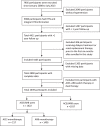Angiotensin-converting enzyme inhibitors or angiotensin receptor blocker monotherapy retard deterioration of renal function in Taiwanese chronic kidney disease population
- PMID: 30804406
- PMCID: PMC6389886
- DOI: 10.1038/s41598-019-38991-z
Angiotensin-converting enzyme inhibitors or angiotensin receptor blocker monotherapy retard deterioration of renal function in Taiwanese chronic kidney disease population
Erratum in
-
Author Correction: Angiotensin-converting enzyme inhibitors or angiotensin receptor blocker monotherapy retard deterioration of renal function in Taiwanese chronic kidney disease population.Sci Rep. 2020 Apr 15;10(1):6631. doi: 10.1038/s41598-020-63162-w. Sci Rep. 2020. PMID: 32296120 Free PMC article.
Abstract
It remains unclear how different uses of angiotensin-converting inhibitors (ACEIs) or angiotensin receptor blockers (ARBs) influence the progression of chronic kidney disease (CKD). This study explored CKD progression in a multicentre, longitudinal cohort study that included 2639 patients with CKD stage 1-5 and hypertension. Patients treated with ACEI or ARB for ≥90 days during a 6-mo period comprised the study group, or no treatment, comprised the control group. The study group was subdivided on the basis of treatment: ACEI monotherapy or ARB monotherapy. Progression of renal deterioration was defined by an average eGFR decline of more than 5 mL/min/1.73 m2/yr or the commencement of dialysis. With at least 1-year follow up, a progression of renal deterioration was demonstrated in 29.70% of the control group and 25.09% of the study group. Patients in the study group had significantly reduced progression of CKD with adjusted odds ratio 0.79 (95% confidence interval: 0.63-0.99). However, when ACEI monotherapy and ARB monotherapy were analyzed separately, none of their associations with CKD progression was statistically significant. In conclusion, ACEI or ARB monotherapy may retard the deterioration of renal function among patients with CKD and hypertension.
Conflict of interest statement
The authors declare no competing interests.
Figures
References
-
- Li, P. K. et al. A report with consensus statements of the International Society of Nephrology 2004 Consensus Workshop on Prevention of Progression of Renal Disease, Hong Kong, June 29, 2004. Kidney Int Suppl, S2–7, 10.1111/j.1523-1755.2005.09401.x (2005). - PubMed
Publication types
MeSH terms
Substances
LinkOut - more resources
Full Text Sources
Medical
Research Materials
Miscellaneous



